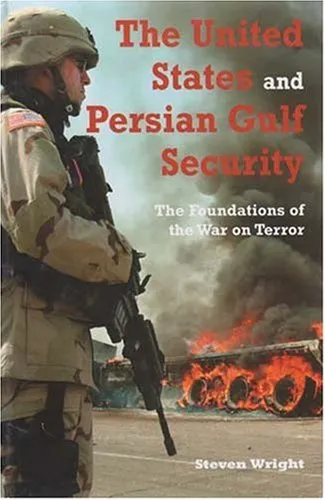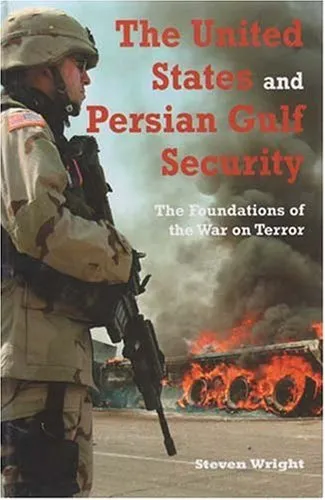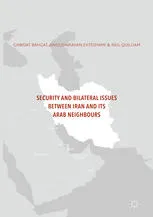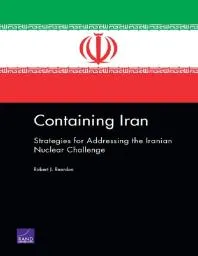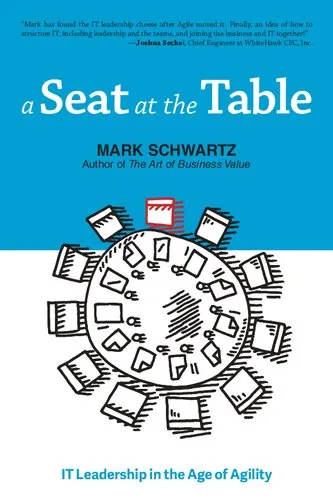The United States and Persian Gulf Security: The Foundations of the War on Terror (Durham Middle East Monographs)
4.0
بر اساس نظر کاربران

شما میتونید سوالاتتون در باره کتاب رو از هوش مصنوعیش بعد از ورود بپرسید
هر دانلود یا پرسش از هوش مصنوعی 2 امتیاز لازم دارد، برای بدست آوردن امتیاز رایگان، به صفحه ی راهنمای امتیازات سر بزنید و یک سری کار ارزشمند انجام بدینکتاب های مرتبط:
مقدمهای بر کتاب "The United States and Persian Gulf Security: The Foundations of the War on Terror (Durham Middle East Monographs)"
کتاب The United States and Persian Gulf Security یکی از منابع تأثیرگذار و برتر در زمینه امنیت خلیج فارس و نقش ایالات متحده در این منطقه است. این اثر به نگارش من، استیون ام. رایت، خط سیر تاریخی، سیاسی و استراتژیک روابط میان ایالات متحده و منطقه استراتژیک خلیج فارس را بررسی میکند که بهویژه بر پایههای ظهور جنگ با تروریسم متمرکز است. موضوعات کلیدی در این کتاب شامل تاثیر استراتژیهای ژئوپلیتیکی، سیاستهای انرژی و تعاملات اقتصادی و نظامی میان قدرتهای جهانی و کشورهای این منطقه هستند.
خلاصهای جامع از کتاب
در این کتاب، من تمامی جنبههای سیاست امنیتی ایالات متحده در خلیج فارس را با دقت به تفصیل کشیدهام. تحلیلها از نخستین مداخلههای ایالات متحده در خلیج فارس، نظیر سیاستهای پس از جنگ جهانی دوم، تا دوره پس از حادثه ۱۱ سپتامبر و ظهور "War on Terror" گسترش مییابد. کتاب همچنین نقش بحرانهای انرژی، استراتژیهای اعمال قدرت و تضادهای ایدئولوژیک میان جهان غرب و بازیگران منطقهای، نظیر ایران و عربستان سعودی، را واکاوی میکند. بررسیها نشان میدهد که چگونه تعادل پیچیده قدرت در خلیج فارس تحت تأثیر سیاستهای جهانی و منطقهای قرار گرفته است.
هدف اصلی این اثر ارائه بینش عمیقتری درباره راهبردهای سیاست خارجی ایالات متحده در قلب یکی از چالشبرانگیزترین مناطق جهان است. تاکید ویژهای به سیستمهای سیاسی داخلی کشورهای حاشیه خلیج فارس، تاثیر نفت بر اقتصاد جهانی، روابط نظامی-امنیتی و همچنین سیاست مقابله با بازیگران غیر دولتی نظیر القاعده شده است.
نکات کلیدی کتاب
- تحلیل تاریخی تأثیر نفت بر سیاستهای امنیتی خلیج فارس
- بررسی نقش تحولات دوران جنگ سرد در شکلگیری اهداف ژئوپلیتیک ایالات متحده
- بررسی ظهور تروریسم بینالمللی و نقش آن در استراتژی "War on Terror"
- تحلیل سیاست تعادل قدرت میان بازیگران منطقهای نظیر ایران و عربستان
- تاثیر روابط نظامی و اقتصادی بر امنیت پایدار خلیج فارس
نقلقولهای معروف از کتاب
"امنیت خلیج فارس هرگز صرفاً یک مسئله منطقهای نبوده است؛ بلکه کلید توازن قدرت جهانی در قرن اخیر به شمار میرود."
"جنگ با تروریسم نتیجه مستقیم تحولاتی است که دههها سیاست نفت و رقابت ایدئولوژیک بر آن مهر تایید گذاشتهاند."
"مسائل اقتصادی و نظامی در خلیج فارس، بازتابی از تغییرات عمدهتر در معماری امنیتی بینالمللی است."
چرا این کتاب مهم است؟
کتاب The United States and Persian Gulf Security برای محققان، دانشجویان و خاورمیانهشناسان که بهدنبال درک عمیقتری از چگونگی شکلگیری سیاستهای جهانی در قبال منطقه خلیج فارس هستند، اثری بیبدیل است. این کتاب کمک میکند تا روابط پیچیده میان سیاست خارجی ایالات متحده، چرخه اقتصادی نفت و چالشهای امنیتی در برابر بازیگران دولتی و غیردولتی منطقهای درک شوند. همچنین، فصل مربوط به "War on Terror" به خوانندگان ابزار مناسبی برای فهم نقش تاریخی تحولات اخیر ارائه میدهد. این کتاب بهعنوان پلی میان پژوهش دانشگاهی و تحلیل استراتژیک عمل کرده و دیدگاهی جامعنگر ارائه میدهد که در دنیای امروز بیش از پیش حائز اهمیت است.
Introduction to "The United States and Persian Gulf Security: The Foundations of the War on Terror (Durham Middle East Monographs)"
"The United States and Persian Gulf Security: The Foundations of the War on Terror" is a comprehensive examination of one of the most dynamic and geopolitically sensitive regions in the world: the Persian Gulf. Through meticulous research and in-depth analysis, this book explores the historical, political, economic, and strategic dimensions of U.S. involvement in this critical part of the Middle East. It delves into how the foundations of contemporary U.S. foreign policy and security concerns in the region were laid, eventually culminating in the War on Terror that defined global politics in the early 21st century.
This book is designed for scholars, policymakers, students of international relations, and anyone with an interest in understanding the intricate dynamics between global power and regional challenges. By examining historical trends and situating them within the post-Cold War context, it reveals how decades of policies, alliances, and conflicts contributed to the unprecedented security dilemmas faced in the Gulf today.
The content critically analyzes the evolution of U.S. strategies in the Persian Gulf and offers insights into the motives, interests, and consequences behind these policies. It contextualizes the War on Terror as a continuation of broader efforts that span decades, offering readers a deeper understanding of the geopolitical and ideological drivers of American foreign policy in the region.
Detailed Summary of the Book
The book begins by establishing the historic role of the Persian Gulf as a vital economic and strategic region, particularly due to its vast reserves of oil and natural gas. It explains how these resources have shaped not only regional political dynamics but also global geopolitical strategies. The United States’ interest in the Persian Gulf is traced back to the mid-20th century, during the Cold War period, when securing access to oil supplies became of paramount importance to Western economies and security frameworks.
As the narrative progresses, the book explores key events such as the Iranian Revolution of 1979, the Iran-Iraq War, the Gulf War of 1991, and the later strategic decisions following the September 11 attacks in 2001. Each chapter dissects how these milestones influenced U.S. policy direction, from its military engagements to the establishment of long-term alliances with Gulf states like Saudi Arabia, Kuwait, and the UAE. The book also highlights the intersecting roles of ideology, economic interests, and global security concerns in driving these policies.
A significant portion of the analysis is devoted to the War on Terror. By examining U.S. military interventions in Iraq and Afghanistan, as well as the impact of counterterrorism initiatives on regional stability, the book shows how the War on Terror is not an isolated phenomenon but the product of long-term trends that stem from the United States’ evolving priorities in the Persian Gulf.
Key Takeaways
- The Persian Gulf’s significance to global energy security has been a fundamental driver of U.S. involvement over several decades.
- The ideological clash between liberal democracy and authoritarianism in the Gulf has served as a backdrop for shaping U.S. foreign policy goals.
- The War on Terror represents a continuation of geostrategic priorities rooted in historical power struggles and economic interests.
- U.S. alliances with key Gulf states have been both a source of stability and a catalyst for regional tensions.
- Understanding the policies of the past is critical to addressing ongoing challenges in the Persian Gulf and mitigating future security risks.
Famous Quotes from the Book
"The Persian Gulf has long stood at the crossroads of global ambitions, serving as both a touchstone for cooperation and a powder keg of conflict."
"The War on Terror did not emerge in a vacuum; it is the result of decades of calculated policies and unforeseen consequences in one of the most strategically vital regions of the world."
"Energy security is not merely an economic issue; it is the lifeblood of modern geopolitics, driving nations to clash and converge in equal measure."
Why This Book Matters
In an increasingly interconnected global landscape, the Persian Gulf remains at the center of critical debates surrounding energy security, terrorism, and international stability. "The United States and Persian Gulf Security: The Foundations of the War on Terror" provides an unparalleled examination of the U.S.'s pivotal role in shaping the history, politics, and future of the region. This book matters not only because it offers a well-researched narrative of historical events but because it also sheds light on the ongoing challenges that continue to affect the global order.
For policymakers, the book serves as a valuable resource for understanding the intricacies of the region and crafting informed responses to its challenges. For scholars and students, it offers a foundation for further study and discussion on the consequences of global power intervention in regional affairs. For the general reader, it serves as an accessible yet profound insight into how decades of strategy, ambition, and conflict have shaped the contemporary Middle East and its relationship with the world.
By reflecting on the past while looking forward to the future, this book underscores the importance of historical context in addressing today's most pressing international issues.
دانلود رایگان مستقیم
شما میتونید سوالاتتون در باره کتاب رو از هوش مصنوعیش بعد از ورود بپرسید
دسترسی به کتابها از طریق پلتفرمهای قانونی و کتابخانههای عمومی نه تنها از حقوق نویسندگان و ناشران حمایت میکند، بلکه به پایداری فرهنگ کتابخوانی نیز کمک میرساند. پیش از دانلود، لحظهای به بررسی این گزینهها فکر کنید.
این کتاب رو در پلتفرم های دیگه ببینید
WorldCat به شما کمک میکنه تا کتاب ها رو در کتابخانه های سراسر دنیا پیدا کنید
امتیازها، نظرات تخصصی و صحبت ها درباره کتاب را در Goodreads ببینید
کتابهای کمیاب یا دست دوم را در AbeBooks پیدا کنید و بخرید
1373
بازدید4.0
امتیاز0
نظر98%
رضایتنظرات:
4.0
بر اساس 0 نظر کاربران
Questions & Answers
Ask questions about this book or help others by answering
No questions yet. Be the first to ask!
